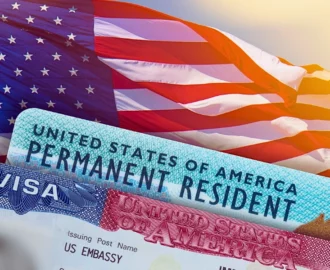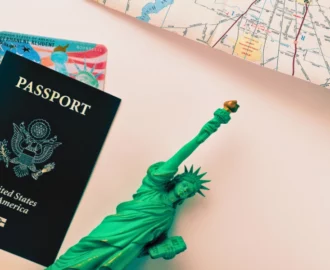U.S. Citizenship and Immigration Services (USCIS) has a process in place to help individuals seek asylum in this country. Understanding what the process entails when completing and submitting asylum applications can help increase your chances of successfully gaining entry into the U.S., where you can live and work as an asylee.

For assistance with applying for asylum or other immigration matters, call Cho Immigration Law at 312-853-3088 to schedule a consultation with an asylum immigration attorney in Chicago.
What Are the Eligibility Requirements for Asylum in the U.S.?
To be eligible for asylum in the United States, you must meet the requirements. Specifically, you will need to qualify as a refugee according to the definition under the Immigration and Naturalization Act. These requirements are as follows:
- You must be either unwilling or unable to return to your country of origin
- You must have reason to believe that you face persecution due to protected characteristics, such as race, political views, nationality, gender, or religion
- You need sufficient documentation to prove the likelihood of persecution if you were to return to your home country
- If past persecution has occurred, you will need documentation proving this persecution
What Is the Application Process for Asylum?
The U.S. government frequently grants asylees the ability to live and work in the U.S. as refugees with lawful permanent resident (LPR) status. A refugee falls into one of the qualifying U.S. visa categories, giving individuals the right of asylum.
In one recent year, USCIS and other agencies approved 54,350 asylum applications. One of the main benefits of applying for asylum and becoming an LPR is the ability to begin the path to citizenship through naturalization.
To apply for asylum in the U.S., you will need to take the following steps to complete the application process:
1. Enter the U.S.
The first step entails arriving in the U.S. from the country where you faced persecution. Here, immigration officials will be able to begin your case to seek asylum.
Depending on the nature of your entry, you may be able to seek either affirmative asylum or defensive asylum. The affirmative asylum process is simpler and allows individuals already in the U.S. legally to complete Form I-589, but due to backlogs, this process can take a long time. Conversely, defensive asylum is for those who are in the U.S. illegally or without a visa, which can result in temporary detainment before the individual is able to apply for asylum.
In any case, an experienced asylum immigration lawyer can guide you through the process.
2. Begin the Application
Within one year after entering the U.S., asylum-seekers need to apply for asylum by filing Form I-589, Application for Asylum and for Withholding of Removal.
However, there are some exceptions to the one-year requirement for filing Form I-589. For instance, circumstances might render you mentally or physically incapable of completing this file after your arrival.
Once you complete and submit this document, USCIS will review it. If the agency accepts your application, you will receive an acknowledgment of receipt along with a date and time to visit a designated office for providing biometric data in the form of fingerprints.
3. Submit Fingerprints and Undergo a Background Check
When you receive your notice for collecting fingerprints from USCIS, this notice will tell you where to go to submit your fingerprints. Typically, this will take place at an approved application support center (ASC). As an asylum-seeker, you will not need to pay the fee reserved for fingerprinting.
At this point, you will also undergo a background check to see if you have criminal convictions that might render you ineligible for asylum. You may be unable to seek asylum if you have convictions for aggravated felonies or other serious crimes, or if you have multiple convictions on your record.
4. Schedule and Complete an Interview
If you pass your background check and can proceed, USCIS will send you a notice with a date and location to attend an interview with an immigration official. It’s important to ensure you’re sufficiently prepared for this interview, as the official will ask you questions about the nature of your entry in the U.S. and desire to seek asylum.
An attorney could help you prepare for the interview by going over questions the immigration official may ask, and he or she could accompany you at your interview. Any children or spouses who may benefit from the asylum status will also need to be present during the interview.
5. Await a Decision
Following the interview, USCIS will complete the review process and further confirm whether you qualify for asylum in the United States. An immigration judge will then make a decision and USCIS will send you a corresponding notice. Typically, the final review process takes about two weeks.
If you receive a notice of approval, you can continue transitioning to LPR status, at which point you would be able to freely live and gain employment in the U.S.
What Happens if USCIS Denies Your Asylum Application?
Sometimes, perhaps even out of error, USCIS may deny your application for asylum. There are multiple reasons immigration applications are denied that could apply to your case. In the event of an application denial, you may appeal the decision, depending on the situation.
Some reasons USCIS might deny you asylum include:
- You don’t meet the basic requirements to qualify for asylum, such as inadequate proof that you would face persecution upon returning to your home country
- The asylum application is incomplete or doesn’t include sufficient supporting documentation
- You miss your interview with USCIS officials
- The immigration official finds inconsistencies between interview answers and your application
- You fail to file on time, as you have one year after entering the U.S. to file your application
In any case, you will need ample evidence to help appeal the denial decision, which is another area where an attorney could help.
How Legal Representation Can Help You
The asylum process is complex and can involve many factors that might present challenges when attempting to earn asylum status. To help you navigate this process and keep it smoother, you will likely need to work with an immigration attorney.
The right lawyer will help you in a number of ways, such as:
Preparing Form I-589 and Supporting Documents
To successfully apply for asylum, asylum-seekers need to complete and submit Form I-589. All the information on this document should be accurate and up to date, and it must match the information on supporting documentation.
In addition to Form I-589, you will need to submit various supporting documents that help show how you would face persecution if you were to return to your country of origin. For example, you will need identification documents, proof of citizenship in your home country, proof of relationships with your spouse and other asylum beneficiaries, and news media and other documentation showing how you and your family would face persecution for protected characteristics.
It can be difficult and time-consuming to prepare all necessary documents on your own, which is where an attorney can assist you. The right lawyer will help complete and organize all documents, while also confirming that information is accurate and consistent across all documentation.
Helping With Your Interview
When attending an interview with an immigration official, it’s crucial to be prepared. An attorney can help you rehearse answers to questions the official could ask during the interview, ensuring your answers align with information on your application and supporting documents.
Additionally, your lawyer could attend the interview with you and give you guidance during this process.
Appealing a Denial
If asylum is denied, it may be possible to appeal the decision. For instance, you may have supporting documentation at a later date that wasn’t available during your initial application, or an immigration judge may deny your application out of error.
In any case, an attorney can determine whether you’re able to appeal the decision and work with you to appeal with the appropriate court.
Other Immigration Matters
If you need help with other issues in addition to asylum applications, such as avoiding removal and deportation or sponsoring other family members to enter the U.S. as immigrants, an attorney could also help with these cases. A lawyer could tailor his or her representation and approach based on your needs to help you secure the best possible outcome in your case.
For help with a Chicago asylum immigration attorney, contact us at Cho Immigration Law and schedule a consultation with one of our lawyers. We may be able to help you with asylum applications and other types of immigration cases based on your requirements.




